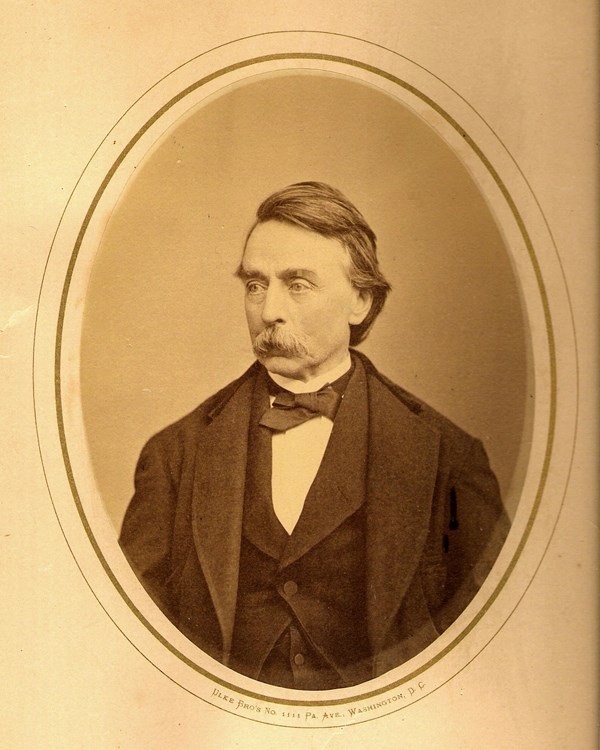Last updated: January 8, 2025
Person
John A. Bolles

Courtesy of Winchester Massachusetts Archival Center
Boston-based lawyer and public servant John Augustus Bolles served as a member of the Boston Vigilance Committee, an organization dedicated to fugitive assistance that formed in the wake of the Fugitive Slave Law of 1850.
Born in 1809 in Connecticut, John Augustus Bolles graduated from Brown University and soon moved to the Boston area. Admitted to the Boston Bar in 1833, Bolles worked as a "counsellor" at 10 Court Street, while keeping his residence in Winchester, outside of the city.1 He married Catherine Hartwell Dix and had six children.2
Bolles involved himself in politics, first with the Democratic party. Over time, his political views shifted as he switched to supporting the Free Soil Party, and later, the Republican party, both of which opposed the extension of slavery.3 Elected in 1843, he served as Secretary of State for the Commonwealth of Massachusetts. He also held other positions of public trust including serving as a member of the Board of Education as well as Commissioner of Boston Harbor and Back Bay.4
In addition to his work in politics, Bolles also involved himself in reform movements. One obituary stated that Bolles "was for many years prominent as an anti-slavery and temperance mover."5 With the passage of the Fugitive Slave Law in 1850, Bolles joined the third and final iteration of the Boston Vigilance Committee, which assisted freedom seekers coming through Boston on the Underground Railroad.6 His name also appeared on a list of people calling for a public meeting at Tremont Temple in April 1851 for those "opposed to the Fugitive Slave Law, and in favor of adopting such measures, within the limits prescribed by the Constitution, as may procure its essential modification or final repeal."7 He also served as counsel for John P. Coburn, following Coburn's arrest for his alleged role in the rescue of Shadrach Minkins.8
Bolles held several positions during the American Civil War. He worked on the staff of his brother-in-law, Major General John A. Dix, serving as a Major, Aide de Camp, as well as a Judge Advocate for the Serventh Army Corps. In Fall 1865, President Andrew Johnson appointed him to the office of Naval Solicitor-General, a position which he held until his death in Washington, DC in 1878.9
Remembered in a Boston paper as "a man of culture, of refinement and of more than ordinary talent," Bolles "was respected for excellent traits of character."10 His remains are buried at Forest Hills Cemetery in Jamaica Plain, Massachusetts.11
Learn More...
Check out the following article about John A. Bolles: Winchester Incorporator Was Active Abolitionist.
Footnotes
- Boston City Directory 1852, 30, https://cdm.bostonathenaeum.org/digital/collection/p16057coll32/id/47.
- John Augustus Bolles, Genealogy of the Bolles family in America (Boston, H.W. Dutton and Son, 1865), 28, https://archive.org/details/genealogyofbolle00boll/page/n81/mode/2up.
- Boston Globe, June 3, 1878, 1; New England Farmer, October 4, 1851; Boston Evening Transcript, October 21, 1852; Bolles, Genealogy of the Bolles family in America, 28.
- Bolles, Genealogy of the Bolles family in America, 28.
- Evening Star, May 27, 1878, 1.
- "Members of the Committee of Vigilance," broadside printed by John Wilson, 1850, Massachusetts Historical Society.
- Liberator, April 4, 1851, 3.
- Boston Evening Transcript, March 5, 1851. 2.
- Bolles, Genealogy of the Bolles family in America, 28; Evening Star, May 27, 1878, 1.
- Boston Globe, June 3, 1878, 1.
- John Eicher and David Eicher, Civil War High Commands (Stanford: Stanford University Press, 2002), 136, Google Books.
